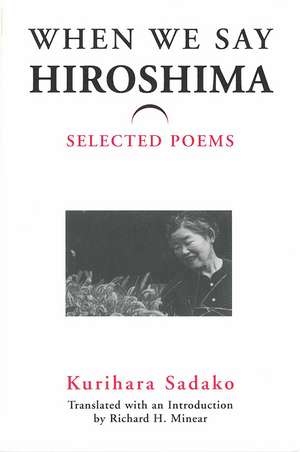When We Say “Hiroshima”: Selected Poems: Michigan Monograph Series in Japanese Studies, cartea 23
Autor Sadako Kurihara Traducere de Richard Minearen Limba Engleză Paperback – mar 1999
Kurihara Sadako is one of the poetic giants of the nuclear age. Born in Hiroshima in 1913, she was in Hiroshima on August 6, 1945. From then till now she has addressed her poetry primarily to issues of nuclear destruction, nuclear weapons, and nuclear power. Herself a victim of the world’s first nuclear attack, she became the poetic conscience of the Hiroshima that was no more. But Kurihara turned her attention soon to more controversial issues, including Japan’s role as victimizer in World War II. Many of her poems attack the Japanese government and its policies then and now.
When We Say “Hiroshima” contains a selection of the poems Kurihara wrote between 1942 and 1989. They include meditations on death, on survival, on nuclear radiation, on Japanese politics, on American foreign policy, and on women’s issues.
Din seria Michigan Monograph Series in Japanese Studies
-
 Preț: 138.75 lei
Preț: 138.75 lei -
 Preț: 198.52 lei
Preț: 198.52 lei -
 Preț: 314.06 lei
Preț: 314.06 lei -
 Preț: 101.20 lei
Preț: 101.20 lei -
 Preț: 175.60 lei
Preț: 175.60 lei -
 Preț: 104.95 lei
Preț: 104.95 lei -
 Preț: 183.81 lei
Preț: 183.81 lei - 8%
 Preț: 500.62 lei
Preț: 500.62 lei -
 Preț: 232.71 lei
Preț: 232.71 lei -
 Preț: 312.93 lei
Preț: 312.93 lei -
 Preț: 312.03 lei
Preț: 312.03 lei -
 Preț: 166.83 lei
Preț: 166.83 lei -
 Preț: 129.94 lei
Preț: 129.94 lei -
 Preț: 129.94 lei
Preț: 129.94 lei -
 Preț: 129.94 lei
Preț: 129.94 lei -
 Preț: 123.56 lei
Preț: 123.56 lei -
 Preț: 167.98 lei
Preț: 167.98 lei -
 Preț: 122.81 lei
Preț: 122.81 lei -
 Preț: 129.94 lei
Preț: 129.94 lei -
 Preț: 170.88 lei
Preț: 170.88 lei -
 Preț: 129.94 lei
Preț: 129.94 lei -
 Preț: 79.78 lei
Preț: 79.78 lei -
 Preț: 298.50 lei
Preț: 298.50 lei -
 Preț: 122.44 lei
Preț: 122.44 lei -
 Preț: 172.24 lei
Preț: 172.24 lei -
 Preț: 129.94 lei
Preț: 129.94 lei -
 Preț: 210.14 lei
Preț: 210.14 lei -
 Preț: 176.98 lei
Preț: 176.98 lei -
 Preț: 174.46 lei
Preț: 174.46 lei -
 Preț: 212.26 lei
Preț: 212.26 lei -
 Preț: 187.87 lei
Preț: 187.87 lei -
 Preț: 197.75 lei
Preț: 197.75 lei -
 Preț: 159.14 lei
Preț: 159.14 lei -
 Preț: 160.85 lei
Preț: 160.85 lei -
 Preț: 197.38 lei
Preț: 197.38 lei - 15%
 Preț: 469.75 lei
Preț: 469.75 lei -
 Preț: 288.08 lei
Preț: 288.08 lei -
 Preț: 171.98 lei
Preț: 171.98 lei - 19%
 Preț: 509.39 lei
Preț: 509.39 lei - 19%
 Preț: 448.41 lei
Preț: 448.41 lei -
 Preț: 171.98 lei
Preț: 171.98 lei -
 Preț: 236.02 lei
Preț: 236.02 lei
Preț: 102.28 lei
Nou
Puncte Express: 153
Preț estimativ în valută:
19.57€ • 20.46$ • 16.54£
19.57€ • 20.46$ • 16.54£
Cartea se retipărește
Doresc să fiu notificat când acest titlu va fi disponibil:
Se trimite...
Preluare comenzi: 021 569.72.76
Specificații
ISBN-13: 9780939512898
ISBN-10: 0939512890
Pagini: 74
Dimensiuni: 127 x 191 x 8 mm
Greutate: 0.09 kg
Ediția:First edition
Editura: UNIVERSITY OF MICHIGAN PRESS
Colecția U of M Center For Japanese Studies
Seria Michigan Monograph Series in Japanese Studies
ISBN-10: 0939512890
Pagini: 74
Dimensiuni: 127 x 191 x 8 mm
Greutate: 0.09 kg
Ediția:First edition
Editura: UNIVERSITY OF MICHIGAN PRESS
Colecția U of M Center For Japanese Studies
Seria Michigan Monograph Series in Japanese Studies
Notă biografică
Richard Minear is Professor of History at the University of Massachusetts at Amherst. A specialist on Japanese intellectual history and on the Pacific War, he has translated Requiem for Battleship Yamato (1985) and the survivor-accounts of t
Recenzii
"From a compelling female perspective, her poems take on death, nuclear annihilation, the Japanese role as a victimizer during the war, U.S. foreign policy, and issues of survival in a violent world."
--New York Theatre Wire, www.nytheatre-wire.com
--New York Theatre Wire, www.nytheatre-wire.com
"Kurihara practices a vivid style of imagery, recreating the disgusting wounds, anguish and death of the atomic bombing. . . .Kurihara's poems are so devastatingly raw that the reader cannot escape from the feelings of empathy and even anger for those who were victimized by the war that took place over a half a century ago. . . . Just as is about remembering death and war, When We Say Hiroshima is also about hope, humanity, and our ability to live. . . . Kurihara makes sure that the reader understands that where death occurs, so does life and with life, there is always hope for a better future. The poems are about pain, sorrow, war and death. But at its core, the book teaches about living."
--Vanessa Pascua, Hawaii Pacific Review, Volume 15
--Vanessa Pascua, Hawaii Pacific Review, Volume 15
“One of Japan’s greatest 20th-century poets, and one of Japan’s bravest and most honest social and literary writers.”
—Japanophile
—Japanophile
“What more heartbreaking description of the bomb could anyone fashion? Fascinating reading.”
—The International Examiner’s Pacific Reader
—The International Examiner’s Pacific Reader
“This poetic voice reveals the horrors of the world for which she dreams only of peace. At times it weeps in despair; at other times, it sings of hope and promise. It is a treatise of intellectual and social history . . . worthy of the highest recommendation.”
—Education about Asia
“Moving and powerful poems offering an image of Japan and the Japanese that is all too rarely available.”
—Friends Journal
—Education about Asia
“Moving and powerful poems offering an image of Japan and the Japanese that is all too rarely available.”
—Friends Journal
Descriere
Compelling poetry that constitutes a major legacy of the nuclear age
